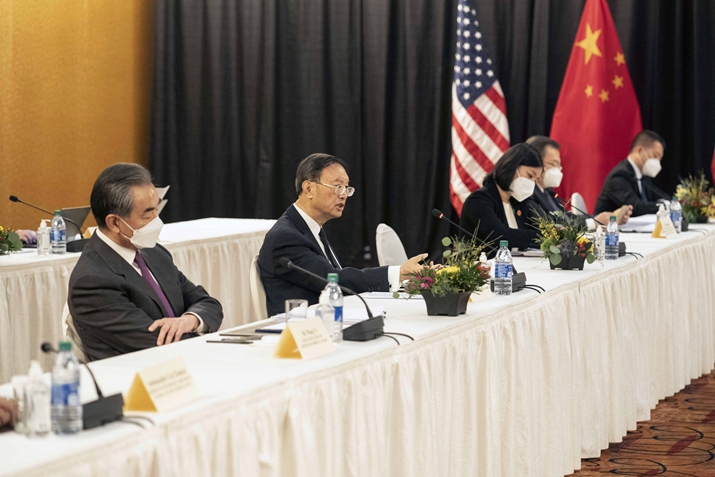State Councilor and Foreign Minister Wang Yi said the door for China-U.S. dialogue would be always open while White House National Security Advisor Jake Sullivan said, "We expected to have tough and direct talks on a wide range of issues and that's exactly what we had."
The debate
From the Chinese perspective, three points were made clear at the talks. U.S. Secretary of State Antony Blinken and Sullivan's allegations of so-called human rights violations in Xinjiang, Hong Kong and Tibet, and cyber attacks and pressure on Taiwan were rebutted. The rebuttal showed China rejected the position of strength and moral superiority adopted by the U.S. and stood firm on its stand that it would brook no interference in its internal affairs.
Yang Jiechi, a member of the Political Bureau of the Communist Party of China (CPC) Central Committee and Director of the Office of the Foreign Affairs Commission of the CPC Central Committee, said China would spare no efforts in safeguarding its national sovereignty, security and development rights.
The Chinese officials also rejected the U.S. perception of an international order based on American rules. Yang pointed out that the U.S. has been trying to form cliques, forcing countries to choose it or China. He emphasized the Chinese stand that multilateralism is an important cornerstone of the current international system. China is willing to work with the U.S. to maintain true multilateralism as represented by the United Nations, instead of one based on America-centered values.
China also disapproved of the Biden administration's view of it as a strategic competitor. Yang reiterated that China's foreign policy is driven by peaceful development and building a community with a shared future for all. China-U.S. relations should be mutually beneficial instead of becoming a zero-sum game, which would recoil on both.
But despite the disagreements, there were areas of converging interest as well. The two sides discussed bilateral relations against the backdrop of the COVID-19 pandemic, which included making reciprocal arrangements for vaccination for each other's diplomatic and consular personnel, and adjusting travel restrictions and visa policies to gradually realize normalization of personnel exchange.
Cooperation on the global agenda clearly has most potential. Coordination to combat climate change fallouts has already started with communication between the two countries' special envoys on climate, Xie Zhenhua and John Kerry. At the Anchorage meeting, the two sides agreed to set up a working group on climate change with more such groups expected in other areas. China made it clear that it welcomes constructive cooperation based on mutual respect and mutual benefit.
Lists of concerns
After the meeting, from the media interviews given by both sides, we can piece together their respective concerns.
For China, its main concern is U.S. interference in its internal affairs. The United States' attempts to form and lead an anti-China clique and provoke confrontation based on ideology pose a threat to China's continued reform and opening up as well as its greater role in global governance.
For the healthy development of bilateral relationship, China has urged the U.S. to adhere to the one-China policy on the Taiwan question and stop sending wrong messages to the forces seeking "Taiwan independence;" to quit interfering in Hong Kong-related issues and stop supporting "Hong Kong separatist" forces; and stop its smear campaign over Xinjiang and abandon the double standard in fighting against terrorism.
It is another concern that U.S. military planes have been conducting frequent close-in reconnaissance in Chinese coastal waters and Washington is sending warships and warplanes into waters near China's islands and reefs in the South China Sea under the pretense of so-called "freedom of navigation operations," challenging China's sovereign rights and increasing the risk of conflict between the two militaries.
The U.S. rhetoric can be grouped into three categories. First, accusations about Hong Kong, Xinjiang and human rights, which are based on fabricated information. And the U.S. is still trying to pressure China and force its allies support it by promoting a so-called "value diplomacy."
Second, call for "reciprocity" and "fairness" in the economy and trade, intellectual property protection, and ensuring security of supply chains and networks. However, the United States' actual intention is to maintain its technological dominance and increase manufacturing competitiveness, and to create favorable conditions for its own economy.
Third, global challenges ranging from climate change to the Iran nuclear issue, Afghanistan, the Korean Peninsula, non-proliferation and beyond. It's led by the Biden administration's ambition to show that "the U.S. is back." However, this is an arena where cooperation with China is essential.
The Anchorage meeting did not bridge bilateral differences overnight since the complicated relationship cannot be resolved by just one dialogue. But the communication helped in showing the issues that carry the risk of conflict and need to be controlled, as well as the common concerns where they can seek common ground while shelving differences.
For example, China has said it would like to cooperate with the U.S. in fighting COVID-19, climate change and the global economic crisis to enhance global governance.
Biden's China policy
The Biden administration reviewed its China's policy as soon as it took office. It sees China as its most serious competitor and will handle relations with China under the framework of strategic competition. Biden plans to engage China with the three tools of competition, confrontation and cooperation.
The Anchorage meeting, initiated by the U.S., was held after the Biden administration completed the first round of coordinating its China policy with U.S. allies, including the first informal quadrilateral security dialogue (Quad) with Japan, Australia and India.
Before the Anchorage meeting, the Biden administration also expanded so-called sanctions on some Chinese officials and entities, while putting more Chinese hi-tech enterprises on its import restriction or close observation list.
So far, Biden has not been quite successful in getting his European allies and Quad partners to join the efforts to contain China. After the Anchorage meeting, Blinken advocated maintaining patience, by which he probably meant prudence.
For the U.S., China issues are now more deeply integrated into its own internal affairs, and are also relevant to its ambition of recovering its global hegemony. While the Biden administration may not continue his predecessor Donald Trump's disastrous China policy, it will have to walk a fine line to avoid criticism domestically as being weak if it tries to rebuild all the burnt bridges. Therefore, it is likely to resume some of the signature policies of the Barack Obama administration, while retaining some of Trump's legacy to maintain a tough image.
For now the Biden administration seems to have chosen long-term strategic competition with China. As it sees it, the competition is not meant for all areas of bilateral relations, only key ones, such as science and technology, the economy, military as well as global governance leadership.
However, the competition is bound to spill over into other sectors as well. So the Anchorage meeting is also a warning that both sides need to continue efforts to keep the communication going and not start a new cold war.















